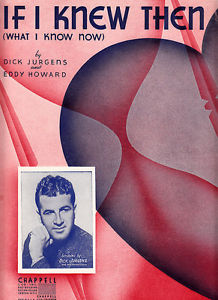
"If I Knew Then" is a 1939 song written by Dick Jurgens and Eddy Howard, and performed by Jurgens' big band with Howard singing. [1] Their version charted briefly in 1939. [2]

"If I Knew Then" is a 1939 song written by Dick Jurgens and Eddy Howard, and performed by Jurgens' big band with Howard singing. [1] Their version charted briefly in 1939. [2]
Bing Crosby recorded the song on February 9, 1940 with John Scott Trotter and His Orchestra. [3] It was also covered by Johnny Mercer and his Pied Pipers (1945), [4] Sammy Kaye and his Orchestra, [5] Sarah Vaughan on Sarah Vaughan with Clifford Brown and Swingin' Easy , Val Doonican (1968) [6] and many others. Ray Conniff's version "bubbled under" the Hot 100, reaching No. 26. [7]